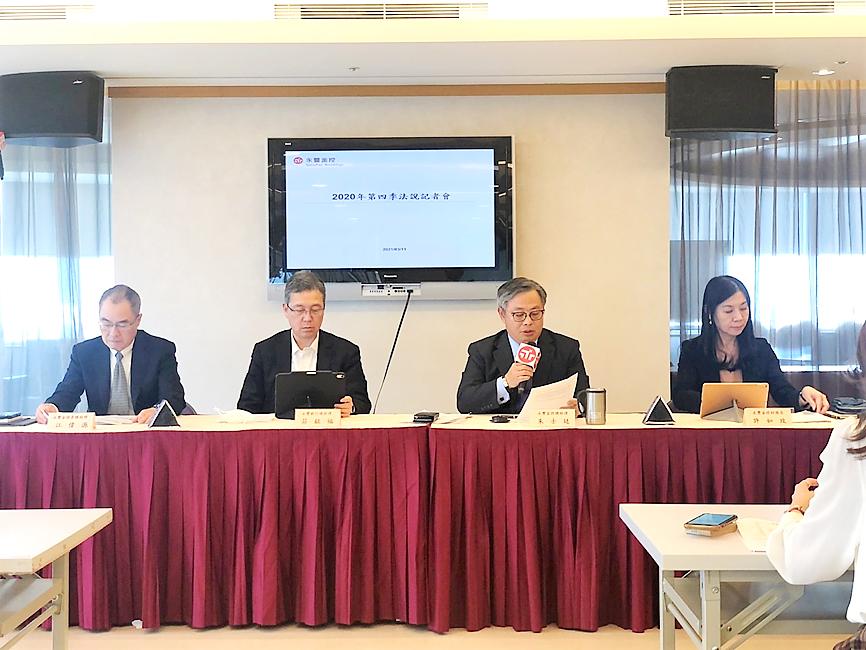SinoPac Financial Holdings Co (永豐金控) aims to generate 30 percent of its profits from overseas operations this year, as well as expand its operations in Vietnam and open a Singapore branch, SinoPac Financial president Stanley Chu (朱士廷) said yesterday.
Its banking arm, Bank SinoPac (永豐銀行), set up a branch in Ho Chi Minh City focused on lending to Taiwanese companies with operations in Vietnam, but it is shifting to tap the consumer financing market, spokeswoman Kerry Hsu (許如玫) told the Taipei Times by telephone.
The bank would start with personal loans in Vietnam, as it expects the nation’s rapid economic growth and rising middle class to boost the growth of consumer loans, Hsu said.

Photo: Kelson Wang, Taipei Times
The Financial Supervisory Commission last year approved the bank’s plan to establish a Singapore branch, he said.
The bank expects to receive regulatory approval in Singapore this year to open the branch, which would be its fourth overseas market, after China, the US and Vietnam, he said.
“We had concentrated on expanding our presence in China in the past few years, by establishing units in eastern and western China. Now we are shifting our focus to Southeast Asia, given the region’s growth momentum,” Hsu said.
The ratio of net earnings generated by SinoPac’s overseas operations to its total net earnings rose from 24 percent in 2019 to 30 percent last year, although SinoPac’s overseas units saw profitability deteriorate due to bad loans amid the COVID-19 pandemic, he said.
SinoPac’s offshore banking unit reported higher profit last year because of strong demand for wealth management and capital management from returning Taiwanese firms, Hsu said.
Due to problematic loans to Pharmally International Holding Co (康友製藥) and Shenzhen Zhaoheng Hydropower Group (兆恆水電), a Shanghai-based unit of China Energy Reserve and Chemicals Group Co (中國國儲能源), Bank SinoPac had to recognize loan-loss provisions of NT$790 million (US$28 million) last year, affecting the bank’s profits, she said.
The loss also accounted for the bank’s net profit falling 5 percent year-on-year, despite its net interest income and net fee income rising to their highest level, Hsu said.
Despite the central bank’s interest rate cuts, Bank SinoPac’s interest spread, the difference between its lending and deposit rates, grew 7.9 basis points to 1.3 percent at the end of last year, due to reduced funding costs, she said.
“Demand deposits made up 50 percent of our total deposits, compared with 40 percent a year earlier, which helped lower our funding costs, as the rates we pay demand depositors were the lowest among all kinds,” Hsu said.

COMPETITION: AMD, Intel and Qualcomm are unveiling new laptop and desktop parts in Las Vegas, arguing their technologies provide the best performance for AI workloads Advanced Micro Devices Inc (AMD), the second-biggest maker of computer processors, said its chips are to be used by Dell Technologies Inc for the first time in PCs sold to businesses. The chipmaker unveiled new processors it says would make AMD-based PCs the best at running artificial intelligence (AI) software. Dell has decided to use the chips in some of its computers aimed at business customers, AMD executives said at CES in Las Vegas on Monday. Dell’s embrace of AMD for corporate PCs — it already uses the chipmaker for consumer devices — is another blow for Intel Corp as the company

STIMULUS PLANS: An official said that China would increase funding from special treasury bonds and expand another program focused on key strategic sectors China is to sharply increase funding from ultra-long treasury bonds this year to spur business investment and consumer-boosting initiatives, a state planner official told a news conference yesterday, as Beijing cranks up fiscal stimulus to revitalize its faltering economy. Special treasury bonds would be used to fund large-scale equipment upgrades and consumer goods trade-ins, said Yuan Da (袁達), deputy secretary-general of the Chinese National Development and Reform Commission. “The size of ultra-long special government bond funds will be sharply increased this year to intensify and expand the implementation of the two new initiatives,” Yuan said. Under the program launched last year, consumers can

Citigroup Inc and Bank of America Corp said they are leaving a global climate-banking group, becoming the latest Wall Street lenders to exit the coalition in the past month. In a statement, Citigroup said while it remains committed to achieving net zero emissions, it is exiting the Net-Zero Banking Alliance (NZBA). Bank of America said separately on Tuesday that it is also leaving NZBA, adding that it would continue to work with clients on reducing greenhouse gas emissions. The banks’ departure from NZBA follows Goldman Sachs Group Inc and Wells Fargo & Co. The largest US financial institutions are under increasing pressure

FUTURE TECH: Nvidia CEO Jensen Huang would give the keynote speech at this year’s Consumer Electronics Show, which is also expected to highlight autonomous vehicles Gadgets, robots and vehicles imbued with artificial intelligence (AI) would once again vie for attention at the Consumer Electronics Show (CES) this week, as vendors behind the scenes would seek ways to deal with tariffs threatened by US president-elect Donald Trump. The annual Consumer Electronics Show opens formally in Las Vegas tomorrow, but preceding days are packed with product announcements. AI would be a major theme of the show, along with autonomous vehicles ranging from tractors and boats to lawn mowers and golf club trollies. “Everybody is going to be talking about AI,” Creative Strategies Inc analyst Carolina Milanesi said. “From fridges to ovens